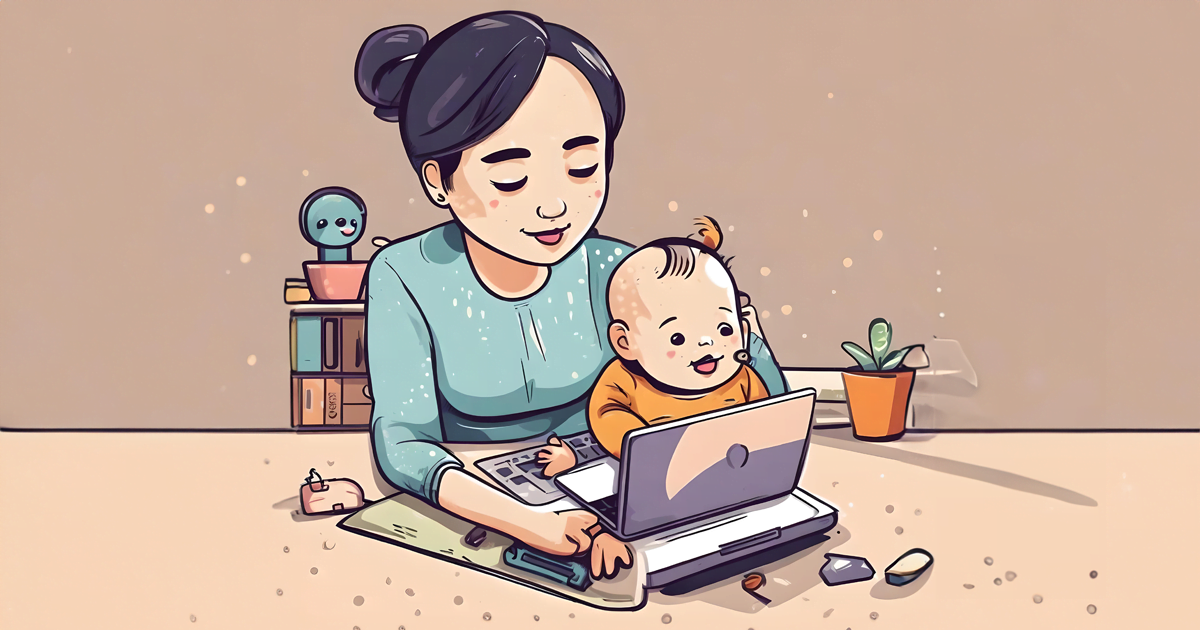Table of Contents
ToggleEmbracing the Journey: Understanding the Challenges of Modern Parenting Challenges
In the midst of a world where change is the only constant, parenting too, has evolved over the years. The way our parents raised us might be starkly different from how we raise our children today. Many parents often find themselves pondering over the question – “Is parenting today more challenging than before?” The simple answer is yes and no. While the core essence of parenting remains the same, the challenges, dynamics, and tools available to parents have significantly evolved over time.
Here’s a look at some of the prominent challenges of parenting in today’s context. We’ll delve into the struggles of being a single parent, the difficulties of co-parenting, and also how we can turn these challenges into opportunities for growth.
To get a broader view of modern parenting styles and their implications, you can read our previous blog post: Assertive Parenting: A Key to Raising Resilient Kids, Comprehensive Look of the Impact of AI on Kids
01. The Challenge of Time Management: Balancing Parenting and Personal Life

Time management is perhaps one of the most daunting challenges that every parent encounters. Juggling between work, house chores, parenting duties, and personal life can leave parents feeling overwhelmed and exhausted.
Parents are constantly faced with the question of how to divide their time effectively to cater to the needs of their children, their work commitments, their partner, and importantly, themselves. Balancing all these demands can often lead to feelings of guilt and inadequacy, especially when it feels like there’s never enough time.
Effective time management requires planning, setting priorities, and sometimes, letting go of perfection. It’s also essential to remember that it’s okay to ask for help, and to take time for self-care. After all, a happy parent is often a better parent.
2. The Digital Dilemma: Navigating Children’s Screen Time

In the age of digital devices, managing screen time for children has become a significant parenting challenge. While technology can be a valuable tool for education and entertainment, excessive screen time can have negative impacts on a child’s physical health, mental well-being, and social skills.
The task of setting boundaries and rules around screen use, deciding what content is age-appropriate, and ensuring online safety, all while trying to keep up with the ever-evolving digital landscape, can be quite daunting.
The key to navigating this digital dilemma is a balanced approach. It’s about teaching children digital literacy, setting consistent screen time rules, encouraging a variety of offline activities, and most importantly, leading by example.
3. The Co-Parenting Conundrum: Aligning Parenting Styles
Co-parenting, whether after a separation, divorce, or in a joint custody situation, can be complex and emotionally challenging. One significant challenge is aligning parenting styles and ensuring consistency for the child across different homes.
The differences in rules, expectations, and parenting approaches between homes can be confusing and stressful for children. It can impact their emotional stability and sense of security.
Navigating this conundrum requires open communication, mutual respect, and a commitment to prioritizing the child’s best interest. It may involve seeking help from professionals like counselors or mediators, and employing tools like co-parenting apps for seamless coordination.
4. Navigating the Terrain of Single Parenthood: Embracing Solo Strength
Single parenthood is a unique journey that brings its own set of challenges. Whether it’s due to choice, divorce, death, or other circumstances, single parents often find themselves bearing the entire responsibility of child-rearing, making decisions alone, and managing their child’s emotional needs.
In addition, single parents must also manage their personal lives, careers, and sometimes, their emotional and financial struggles. Despite the multitude of responsibilities, many single parents show remarkable resilience and strength.
The key is to build a strong support system, make use of resources designed for single parents, and remember to take care of personal well-being too. After all, your health and happiness directly impact your child’s wellbeing.
5. Maintaining Consistency in Parenthood: The Steady Anchor
Consistency is often hailed as a key aspect of successful parenting. This involves establishing and maintaining a stable routine, setting clear expectations, and being consistent with discipline and rewards. The challenge arises when life’s unpredictability intervenes, or when other caregivers in the child’s life, such as co-parents, grandparents, or childcare providers, have different approaches.
Maintaining consistency provides children with a sense of security, aids in their development, and helps instill discipline. It is important to communicate and collaborate with all the caregivers in your child’s life to maintain consistency in terms of rules, routines, and parenting styles.
Remember, consistency does not mean rigidity. There should always be room for flexibility and understanding as children grow and situations change.
6. The Mounting Pressure of Parental Expectations: The Balancing Act
Expectations are a natural part of parenting. After all, parents want the best for their children and strive to guide them towards successful futures. However, the challenge lies in balancing these expectations and ensuring they are realistic, age-appropriate, and take into consideration the child’s unique abilities and interests.
High parental expectations can put enormous pressure on children, leading to stress, anxiety, and a potential loss of self-esteem if they feel they can’t measure up. On the other hand, having no expectations at all can result in a lack of motivation and direction for the child.
It’s essential to create an environment where children are encouraged to explore their passions, make mistakes, learn, and grow, all while knowing that their worth is not tied to their performance. Encouraging effort over outcome can be a more fruitful approach in fostering growth and learning.
7. How Parenting Today Differs from the Past: The Evolution of Parenthood
Parenting has drastically evolved over the decades. The rise of digital technology, changing societal norms, and shifts in family structures have added new layers of complexity to the parenting landscape.
In the past, children often had more freedom to roam, learn, and play independently. Parenting was more about providing basic needs, with less focus on emotional nurturing or structured learning. Today, parents grapple with issues like screen time, online safety, and ensuring their children get a competitive edge in an increasingly demanding world.
Moreover, modern parents are more conscious about their children’s mental health and emotional well-being, often taking a more hands-on, involved approach compared to parents of previous generations. There’s also an increased understanding and acceptance of different parenting styles and family structures, including single parenting, same-sex parenting, and blended families.
Parenting today involves navigating a delicate balance between guiding children through the modern world while not losing sight of timeless values like kindness, respect, and empathy.
8. Why We Yearn for the Difficult Days of Parenthood: The Paradox of Parenting
One of the complex aspects of parenting is how we often end up missing the challenges once they’re past. Why do we yearn for those sleepless nights, toddler tantrums, or teen rebellions?
The answer lies in the essence of parenthood – it’s an emotional journey that deeply shapes our identities. The challenging days are often the ones filled with growth, learning, bonding, and love. These are the days that bring us closer to our children, help us understand them better, and make us appreciate our roles as parents.
Every phase of your child’s life comes with its set of challenges, but also its unique joys. The tiny baby who kept you up at night soon becomes a toddler exploring the world, then a teenager forging their own path. With each stage, we let go a little more, making us miss the days when they needed us in different, more intensive ways.
The truth is, the difficult days of parenthood are demanding, but they’re also rewarding in their own special ways. They remind us of our strength, resilience, and the depth of our love for our children.
9. Dealing with Inconsistent Co-parenting: Finding the Balance
Inconsistent co-parenting can be one of the significant hurdles parents face post-separation. When two households operate under different sets of rules, it creates confusion, discord, and distress for the child.
Co-parenting demands cooperation, communication, and compromise. It requires setting aside personal differences and focusing on the child’s best interest. Consistency in rules, expectations, and parenting styles is key to providing the child with a stable, secure environment.
Dealing with an inconsistent co-parent can be a challenging task, but not an impossible one. Here are some strategies that can help:
Maintain open communication: Regularly discuss matters concerning the child, their routine, behavior, education, and health.
Seek professional help: Family therapists, mediators, or legal advisors can provide valuable guidance to manage co-parenting challenges.
Stay flexible: While consistency is crucial, so is the ability to adapt and accommodate reasonable changes.
Prioritize the child: Remember, the goal of co-parenting is to ensure the child’s happiness and well-being. Decisions should be made with this priority in mind.
10. Combatting the Challenges: Strategies for Successful Parenting
While the difficulties of parenting can seem overwhelming, it’s important to remember that every challenge presents an opportunity for growth and learning. The key lies in understanding the unique issues you face and developing effective strategies to handle them. Here are some general techniques to make your parenting journey smoother:
- Consistency is Key: Maintain consistency in rules and routines to provide a stable environment for your children. This principle is particularly important in co-parenting situations.
- Embrace Technology: Use technology to your advantage. There are numerous resources and apps designed to help with aspects of parenting such as time management, education, and co-parenting coordination.
- Communication: Open and honest communication is essential. Encourage your children to express their feelings and thoughts. In co-parenting situations, effective communication with the other parent can prevent misunderstandings and conflicts.
- Self-Care: Don’t forget to take care of your own physical and mental health. Parenting is a demanding job, and it’s important to recharge and relax.
- Seek Support: Don’t hesitate to ask for help. Whether it’s from friends, family, or professionals, getting support and advice can make a world of difference.
Remember, there’s no such thing as perfect parenting. Mistakes and challenges are part of the journey. Stay patient, stay positive, and remember, you’re doing your best for your children.
Conclusion: Rising Above the Parenting Challenges
Parenting is a journey that, despite its many challenges, offers unparalleled joys and rewards. By understanding the unique struggles each parenting style presents, and embracing the tools and resources available, parents can navigate this journey more effectively.
A valuable resource for parents struggling with co-parenting is CoParentingInternational, which provides strategies and guidance to help create a positive and healthy co-parenting environment. For single parents seeking support, Single Parents Alliance of America offers a wide range of resources and community support.
In this modern era, it’s important to remember that it’s okay to ask for help, to take a step back when needed, and to learn from our mistakes. After all, every challenge presents an opportunity to grow and learn, not just for our children, but for us as parents as well.
One specific challenge that can seem like quite a mountain to climb is dealing with ungrateful stepchildren. But don’t worry, we’ve got your back. Check out our comprehensive guide on How to Deal with Ungrateful Stepchildren for some useful tips and strategies.
We hope this blog post has shed some light on the varied parenting challenges that one might face, and that the strategies and insights shared have provided some guidance. Remember, the challenge doesn’t define your parenting; how you choose to face it does.
You might also find it interesting to see how AI is influencing parenting in our blog post: Child-Siri Interaction: Unveiling the Impact of AI on Kids.
Have you faced any of these challenges? How did you overcome them? We’d love to hear from you. Share your stories and tips in the comments section below. And if you found this post helpful, feel free to share it with other parents who might benefit from it.
Thank you for reading and remember, parenting is a journey, and you’re not alone.









